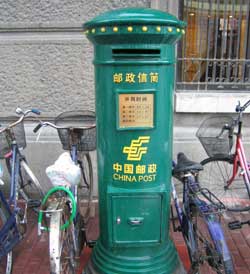
Telecommunication and Media in Shanghai :
Setting up Internet, Phone and TV
 Shanghai has a pretty good telecommunications infrastructure. Telephone lines are reliable and international dialing is simple to arrange, although through lack of competition, prices for calls will be more expensive than in your home country.
Shanghai has a pretty good telecommunications infrastructure. Telephone lines are reliable and international dialing is simple to arrange, although through lack of competition, prices for calls will be more expensive than in your home country..
Broad band is inexpensive, widely available and usually included in rental packages. However, it is much slower than the in the west, even if you have the widest possible connection.
Photo: enterAsia Art
Sending large files can be a complete nightmare and everyone experiences long delays in sending and receiving emails from abroad. For some reason, offices generally have much faster connections. So, if you need to send a big file or do something in a hurry - use your partner's office facilities.
You need to be aware that many internet sites are unavailable from China because their content is deemed unsuitable. This can be frustrating if you are trying to track down news from your home country.
| Info: Phone Inquiries | ||||||||||||||
|
||||||||||||||
 Applications for telephone lines
Applications for telephone lines
Applications take 3-6 days to process. Call Shanghai Telecoms, and they will send their team down to connect you. The landlord usually applies for the telephone line, as it should be in the name of the owner of the property. He will have to bring evidence of home ownership.
Shanghai Telecoms has a monopoly, so IDD rates are not as competitive as they are elsewhere.
With the Shanghai Telecoms Yitong card, you can use a stored value card to make international long-distance calls.
Yitong cards, and all calling cards, may be purchased at post offices and convenience stores. You can also buy them online at:
| Website: | |
| Calling Cards | http://www.cncards.com |
| Info: | ||||
|
||||
Shanghai Telecoms is offering a China Calling Card Service, which uses an intelligent card (300) which retains your account number and password, and automatically debits the card each time you use it. The card is obtainable from the web site above and from the post office.
You can use either PC-to-PC calling, which is usually free, or PC-to-phone, for which you have to set up an account and get charged phone rates.
| Website: | |
| Internet Phones | |
| http://www.net2phone.com | |
| http://www.go2call.com/ | |
The mobile phone market can be almost compared to selling fast, perishable fruits, as a model just purchased will be outdated within a short while. Prices usually drop dramatically just one month after their launch. A pay-as-you-go mobile phone can be purchased for 600-700rmb plus the cost of a sim card (e-tong cards are popular and widely available).
Calls are cheap and you can find 100rmb stored value cards for mobile phones from most convenience stores. The operation for loading the stored value onto your phone is in English.
It's wise to keep the paperwork you get with your sim card to ensure you are buying the right stored value card for your particular service provider, as there are several operators competing in this frenetic marketplace.
If you already have a mobile phone, you might find that Chinese sim cards will work in it just fine. This depends entirely on the model and make of your phone. ![]() Of course, you might even choose to keep your current service provider and pay your bill back in your home country. Although, costs for dialing and receiving are extremely high.
Of course, you might even choose to keep your current service provider and pay your bill back in your home country. Although, costs for dialing and receiving are extremely high.
The network coverage across China is excellent and there are few places where you will fail to get a signal.
| Info: | ||||
|
You may either connect your computer to the internet via a modem to your telephone line or, as most westerners do, via an ADSL broadband facility.
 Applications for telephone In both cases you need to inquire about any technical requirements for your computer. Additionally you must plan for either an additional telephone point or a cable point, which will be charged to you one time on installation.
Applications for telephone In both cases you need to inquire about any technical requirements for your computer. Additionally you must plan for either an additional telephone point or a cable point, which will be charged to you one time on installation.
Shanghai Telecoms will install Asymmetric Digital Subscriber Line (ADSL) with no need to share the bandwidth with other users. Net surfing speeds will not be affected when other users log on and this service also enables users to use their phone and fax while the modem is running. The cost of this is RMB 130 per month (residences) but you get better deals if you pay a year in advance.
As mentioned above, lines can be a lot slower than in the States of Europe and you may have problems downloading emails. Most people find that their server is unable to cope with even a smallish number of incoming emails.
cope with even a smallish number of incoming emails.
Users must regularly go to their web browser to view and organize their emails. By deleting a few, it is then usually possible to unblock the system and receive emails.
Most landlords will provide the ADSL service for tenants. Your service provider will supply you with an ADSL modem and connect your computer to it.
Remember to keep the password and username they give you in a safe place - it is almost impossible to get issued with a new one.
Photo: Microsoft Office Clipart
| Info: | |
|
If you decide to dial direct via a modem, you will need an ISP, or internet service provider. Rates vary, so you should check around. In this case, you will have to pay the ISP monthly charge on top of your phone bill.
| Website: | |
| Shanghai Online | http://www.enonline.sh.cn |
| etang | http://www.etang.com.cn |
| sina | http://www.sina.com |
Shanghai has quite a few cyber cafes, but many are underground and almost all are smoke filled and unpleasant. After a fire in Beijing killed several patrons at an illegal internet cafe, the authorities have been cracking down hard. Even the legal ones seem to keep moving, so it's best to check the web or to go to the Shanghai Library, where there is a large public internet access room.
| Addresses: | ||
|
| Website: |
| Internet Cafes in Shanghai |

Cable TV is legally accessible in private homes. This includes a package of foreign channels including CNN, BBC, MTV, HBO, Nickolodeon, ESPN, Cartoon Network, Star World, etc. If you are not in a high-rise building, the service can be sporadic. Again, your landlord will arrange this for you as part of your rental agreement.
| Website: | |
| Cable | http://www.cableplus.com.cn |
Western newspapers are not freely available in Shanghai. Only at a few major hotels will you find the International Herald Tribune and Hong Kong's South China Morning P ost The most commonly read newspaper is the Shanghai Daily, which does cover major international events, but is mainly concerned with the economic progress of the city.
| Website: English Newspaper Editions in Shanghai | |
| Overview China Media | http://www.mondotimes.com/1/world/cn |
| China Daily (English) | http://www.chinadaily.com.cn/english/home/index.html |
| Shanghai Daily (English) | http://www.shanghaidaily.com/ |
| Shanghai Star (English) | http://www.shanghai-star.com.cn/ |
| Beijing Review (Magazine) | http://www.bjreview.com.cn/ |
Many of the major expatriate associations have their own monthly publication for members, with information on expatriate life and events.
| Info: | ||||
|
||||
| Addresses | ||||||||||||||
|
||||||||||||||
More magazines see Entertainment and Tourism and Travel
See e-relocation Step 6 Broadcasting and TV for international information.
 The postal delivery service in Shanghai is quite reliable, but you will find that it takes several weeks for post to arrive from abroad.
The postal delivery service in Shanghai is quite reliable, but you will find that it takes several weeks for post to arrive from abroad.
Sending post, however, is considerably quicker. The fastest and most inexpensive means of getting letters or parcels abroad is to use the EMS service, available at all post offices. It is quite inexpensive and guarantees delivery within 3 days.
A large parcel will cost no more than 300rmb. If you need a faster, next-day delivery service, all the major international courier operators have offices in
Photo:enterAsia Art
Shanghai. The Shanghai Centre post office offers an English speaking service, but many post offices will have staff able to converse in broken English. Post offices are also useful for paying bills.
Website: |
| Shanghai Post and Telecommunications |









